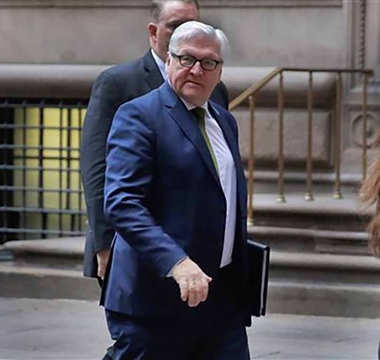Key countries meet to push forward Syrian peace process

UNITED NATIONS (AP) — Some 20 foreign ministers gathered Friday for the latest conference on Syria's civil war, hopeful about arranging a cease-fire and launching peace negotiations in the new year.
But the diplomats remained divided over a resolution that the U.N. Security Council was expected to adopt just after the talks endorsing the process. And Syria's main opposition group said a Jan. 1 deadline for starting talks was "too ambitious."
The ministers were meeting for the third time to push forward an earlier agreement setting that deadline.
"We need to make sure the political process is irreversible in the face of this severe threat posed by international terrorism," Chinese Foreign Minister Wang Yi said as he headed into the meeting at a New York hotel.
"We must realize the political process is going to go backward if we are not making progress," he said.
Wang said the two most important issues are launching political negotiations and implementing the cease-fire. "Without peace talks, the cease-fire cannot be sustained. Without a cease-fire, peace talks cannot continue to produce results," he said.
Serious differences remain between Russia and Iran, which support the government of Syrian President Bashar Assad, and backers of the Syrian opposition, including the United States, key European nations, Saudi Arabia and Qatar.
Russia and the West continue to be split on the central issue in any discussions on a political transition: the fate of Assad.
British Ambassador Matthew Rycroft said negotiations were still taking place on the Security Council resolution. U.N. diplomats said a key stumbling block was how to address the issue of the transitional government.
"We continue to look at this optimistically and are putting a lot of effort into getting an agreement," Rycroft said.
On Thursday, Iranian Foreign Minister Javad Zarif told The Associated Press there "seems to be no agreement" on two other key issues: Syrian opposition groups that should be included in peace negotiations, and Syrian groups that should be considered terrorist organizations instead.
Rycroft said the Security Council resolution would not break new ground but would enshrine agreements from talks in Vienna and Geneva.
The resolution would be a rare gesture of unity in a Security Council that has been bitterly divided on Syria. But Russian Ambassador Vitaly Churkin said Thursday, "I'm not sure it's going to happen."
A peace plan agreed to last month by 20 nations meeting in Vienna sets a Jan. 1 deadline for the start of negotiations between Assad's government and opposition groups. The plan says nothing about Assad's future but says that "free and fair elections would be held pursuant to the new constitution within 18 months."
The Jan. 1 deadline is "too ambitious a timetable," the U.N. representative for the Syrian National Coalition, the main Western-backed opposition group, told reporters Friday morning. Najib Ghadbian estimated that a month of preparation is needed.
Ghadbian also said a comprehensive solution to the conflict requires "the removal of all foreign troops from Syria, all of them," including Russia, which began airstrikes there in September. The strikes are focused on more moderate forces fighting Assad in areas where the Islamic State group has little or no presence.
"For us, the utmost priority is to stop the killing. Then we can make headway with a cease-fire and political transition," Ghadbian said.
Edith M. Lederer, Cara Anna. Copyright 2015 The Associated Press. All rights reserved. This material may not be published, broadcast, rewritten or redistributed.
The Gayly - 12/18/2015 @ 11:01 a.m. CST





